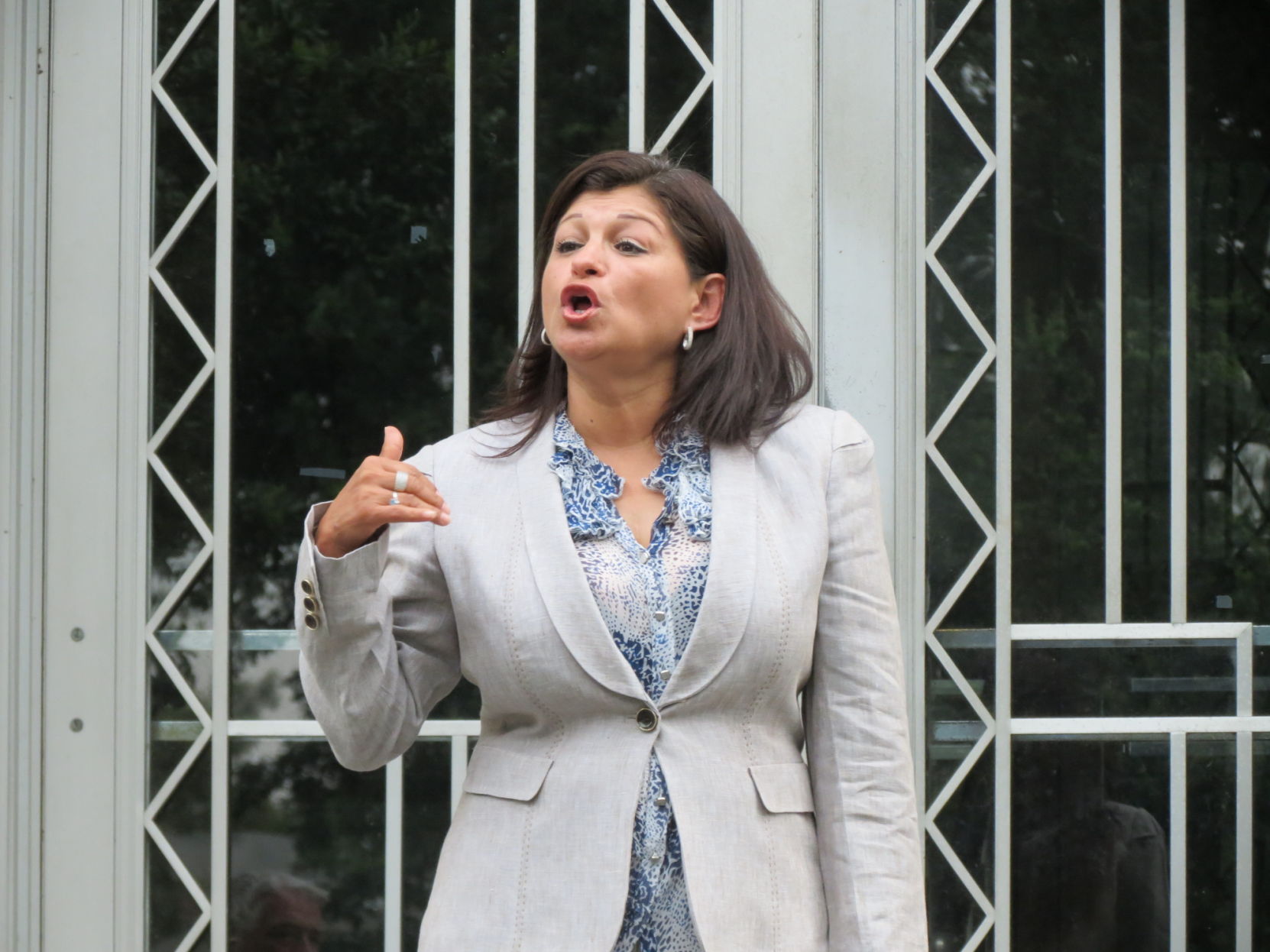
E.D. White’s Trosclair juggling many roles
August 5, 2014‘Students will be ready for any test’
August 5, 2014Replacing a Houma court interpreter accused of extorting people she was supposed to help is a task local officials say they can manage quickly enough, resulting in no disruption to calendars or proceedings.
But a close look at options for aiding people who cannot speak English in local courts show a system that falls below Louisiana’s already minimal standards, despite claims by officials that all appears well.
Interviews with local court administrators, advocates for immigrants, justice system experts and state officials as well as information from relevant documents raise questions of local adequacy in a system vulnerable to being a vehicle of abuse toward vulnerable people, with little opportunity for quality control and oversight.
• No available interpreters in Terrebonne or Lafourche parishes currently qualify for registration in a state program designed to professionalize the practice.
• Advocates say some local interpreters sometimes give legal advice to the people they service, in itself a violation of the law, without officials knowing about it.
• Unlike Texas, California and a growing number of other states, Louisiana does not mandate that courts use only licensed or certified interpreters, merely maintaining a voluntary registry.
• Local officials do not mandate that interpreters meet the minimum thresholds for Louisiana’s voluntary registration program.
• Failure to meet appropriate standards could jeopardize federal money courts may receive now or in the future.
• Inadequate administration of interpreter services could result in convicted criminals having better chances of new trials and appeals.
“Our American system of justice cannot function if it is not designed to adequately address the constitutional rights of a very large and ever-growing portion of its population, namely litigants with limited English proficiency,” said Mary McQueen, president of the National Center for State Courts, following a 2012 summit on the topic attended by Louisiana court officials.
Just what constitutes “adequate” is certainly subject to debate. But experts in law and language generally agree that merely having a bilingual person doing cold oral translation is far from enough.
“I tell people to be very careful of the translators in medicine or the law. Sometimes the people who need help think they are their lawyers,” said Dora Delancey, who does outreach for the Hispanic ministry at Annunziata Church in Houma. They can’t really always help them in the right way.”
ADVOCATES WARY
Carmen Duhe works as secretary at Sacred Heart Church in Cut Off and is bi-lingual. She routinely communicates with members of immigrant families and has heard of problems with interpreters at court.
“The people have told me they are charged a lot of money, that in court they don’t represent them well,” Duhe said. “Sometimes when people translate, they will say to the person ‘don’t say that’ and they give advice.”
Duhe says she has been asked by people in the past to interpret in court but has refused.
“I have been here 20 years and still don’t know all of the English language,” she said, expressing an appreciation of knowledge levels for both English and court proceedings required for effective interpretation.
Too often, some critics say, untrained interpreters will make crucial errors in judgment specifically because they identify with recent immigrants, thinking they are helping, sometimes taking on more responsibility than the law and good sense allow.
Spanish-speaking people make up the biggest group of immigrants locally, by estimates from the Diocese of Houma-Thibodaux numbering in excess of 10,000 in Lafourche and Terrebonne.
Combined with lack of knowledge about the judicial system by immigrants, some of whom come from countries where bribery or overall lax enforcement of the law is common, inadequacy can fly in the face of how the system is designed to work, said Carmen Gustafson, who does volunteer outreach work through her church.
“For many, there is a lack of basic knowledge of how our system here works. The person translating has to have a certain level of education and a comprehension of what the job is asking them to do,” Gustafson said. “And they must not have an emotional connection to the experience of immigration. You cannot just hire anybody to do a translation and come out with a true statement.”
Although fluent in Spanish and English, Gustafson does not hold herself out as an interpreter either, maintaining that she has neither the time nor the skill set to do so appropriately.
CASE ON POINT
Some advocates said they had heard complaints about Trina Marie Bourg, a 45-year-old interpreter who worked frequently on a freelance basis for the Terrebonne Parish Indigent Defender’s Office.
The family of a reportedly undocumented forgery suspect, Israel Oropeza–Monterrosa, did not initially notify authorities of allegations that Bourg was shaking them down for money.
It was only after they told their story to a church liaison and another interpreter that they were urged to contact authorities with their complaints, and they did.
According to court papers and documents related to the investigation, Bourg committed a 2011 shakedown and then attempted to victimize the family again this year, for a total of nearly $4,000 in alleged payoffs.
Bourg faces charges in state and federal courts, and is no longer interpreting in Terrebonne. No other criminal complaints are known to be pending against her.
She was booked last month on state charges of theft, malfeasance in office, abuse of office and extortion. A federal complaint charges her with solicitation of bribes.
Bourg is alleged to have told family members that she would use the money to bribe officials at the U.S. Department of Homeland Security to keep Oropeza–Monterrosa from being sent to a faraway federal facility where they could not visit him.
Bourg maintains that she will be vindicated.
But advocates for immigrants say her alleged wrongdoing is a telling example of why more attention needs to be paid to benchmarks for interpreter selection and performance.
They also note that as an interpreter for the IDB, she had ample access to confidential information about clients she visited in jail settings with attorneys, making ample opportunity for victimization.
Bourg is not and has never been on the list of registered interpreters developed by the Louisiana Supreme Court last year, in its efforts to standardize and professionalize court interpreters.
State records show that she signed up for classes but never attended them. IDB director Tony Champagne said that until Bourg’s arrest neither he nor other attorneys had reason to believe her work was anything but satisfactory.
Members of the local bar who do not speak Spanish, including some prosecutors, acknowledge that they have no idea what interpreters are telling people in court, and trust that all is above-board.
CORNERSTONE OF JUSTICE
Louisiana’s attempts to professionalize court interpreters, which could eventually lead to required certification, are rooted in the same concerns raised by the American Bar Association in its draft of standards relating to that subject.
“The principle of equal treatment under the law is a cornerstone of the U.S. judicial system upon which the legitimacy of the justice system depends,” states its introduction. “In order for a court system to be open and accessible to individuals who are not proficient in English, language access services, through the use of qualified interpreters and translated materials, are vital.”
The guiding principles of the ABA position are the bulwark of a 2010 letter to the states from Assistant U.S. Attorney General Thomas E. Perez, who put them on notice that “policies and practices that deny (limited English proficiency) persons meaningful access to the courts … may also place state courts in violation of long-standing civil rights requirements.”
The letter is a re-statement of sorts, stemming from an Aug. 11, 2000, executive order signed by President Bill Clinton directing federal agencies to ensure that needs of people who don’t speak English are met. The order requires that states and other entities receiving aid from those agencies “reasonably” meet those needs as well.
The only local interpreter known to attempt placement on the state’s registry is a restaurateur and retailer, Josephina Fondaw.
Houma hearing officer William Dunckelman uses her frequently to interpret on the child support and paternity matters he handles, and he expresses confidence in Fondaw’s abilities and beneficent intent.
“She is a good lady, a sweet professional who has demonstrated the ability to work in the courthouse,” Dunckelman said.
WE ARE NOT ATTORNEYS
Fondaw supports the idea of registration and certification and has taken the courses Louisiana offers for interpreters.
“Definitely the number one thing we have to let them know is that we are not attorneys,” Fondaw said, acknowledging the potential for confusion. “I want to see it be a profession. Too many times, people get taken advantage of. We have people that know the needs and take advantage by charging too much. But nobody questions the qualifications. Anybody can just go to the court and translate, and that can be someone taking advantage of the other person.”
When potential clients come to her east Houma office, Fondaw explains the criminal charge to them with the help of a paper given to her by the court. In most cases, she said, people are in court for DWI offenses.
She says she does not give them legal advice, but does assist them with keeping track of attorney appointments and other matters.
“I believe it is my job to give them the resources, for them to be helped,” Fondaw said. “I do not charge for that. I know the Code of Ethics through the training from the Supreme Court.”
Although she has taken the classes, Fondlaw is not on the Supreme Court A-list.
She acknowledges that before that happens, she must re-take the required English proficiency exam.
Another interpreter used by the courts in Terrebonne Parish for more than 20 years is Marine Corps veteran Richard Aldape.
FELONY HISTORY
Aldape has no desire for certification and is also not on the Louisiana registry. He has already been told that it is not required.
Placement on the list could be a problem for Aldape, who has a felony conviction stemming from a 2009 drug arrest. He says he has not had an opportunity to get the record expunged but plans to. The arrest, he says, was the result of a frame-up. Local prosecutors and attorneys are aware of the history, but say they are comfortable working with him.
Aldape has worked in and around the Terrebonne courts for nearly 20 years.
Louisiana’s registration program was developed primarily by Assistant Court Administrator Richard Williams.
Its stated purpose is to “help courts and other related entities utilize qualified interpreters on a freelance basis,” noting that freelancers “are not employees of the courts.”
Interpreters are listed with the Supreme Court as “registered” in the language for which they have tested if they complete the two-day course, pass a standard written English examination as provided by the National Center for State Courts, pass a written translation examination, agree to be bound by Louisiana’s Code of Professional Responsibility for Language Interpreters, and pass a criminal background check.
FRIENDS FROWNED ON
Guidelines the U.S. Department of Justice has prepared for state entities say hiring of bi-lingual staff, creating specific positions for interpreters is an appropriate way to meet the mandates of Title VI of the Civil Rights Act. Contracting with a qualified outside service is also acceptable.
Qualified volunteer interpreters get a green light from the Department of Justice if used on a formal basis, after signing confidentiality agreements.
“Generally, it is not acceptable for agencies or recipients to rely upon an individual’s family members or friends to provide the interpreter services,” states a DOJ fact sheet, which includes a provision that “competent language services” should be supplied free of cost.
Family or friends may be used in “rare emergency situations” but they are used frequently in Terrebonne Parish. The ersatz interpreter in those cases is sworn in to tell the truth.
BURDEN ON JUDGES
Some Louisiana jurists and administrators are still using what they learned at a 2012 national summit to help shape future dealings with interpretation needs.
Hammond City Court Judge Grace Gasaway was a member of the Louisiana delegation at the National Center for State Courts 2012 summit in Houston, along with Orleans Criminal Court Chief Judge Camille Buras, State Criminal District Court Deputy Judicial Administrator Shannon Sims and Judge Max Tobias of the 4th Circuit Louisiana Court of Appeal, and the Supreme Court’s Richard Williams.
The summit, Gasaway said, went a long way toward bringing to life points Louisiana court administrators had already been trying to instill.
“We spoke with representatives from other states who have faced this problem on a much greater scale than Louisiana,” said Gasaway, an 18-year veteran of the bench, noting that some southwestern states have had to cope with as many as 40 Native American dialects. “I gained a greater appreciation of why we are doing what we are doing. It really is a substantive issue of making everyone subject to the court feel as if they belong there. Yet we are meting out justice to them and don’t even speak to them effectively. Many years ago on the bench we said this isn’t our job, access to justice. Now we know.”
She is confident that eventually the state will effectively push toward its goal of joining others that require certification of interpreters.
Until then, it is up to local judges, Gasaway said, to examine how their courts work and whether they meet the relevant standards. There will be no need, she predicted, for legislation to force the hands of local judges and administrators.
“Some judicial discretion is better,” she said, noting that she is a strong supporter of an independent judiciary. “And so we need to better educate our judges as to the need for integrity and thoughtful decision making. That burden rightfully should be on our judges.”
PUBLIC CAN ASSIST
Legislating standards in translation and interpretation matters is not new in Louisiana, however.
While there are no mandated standards for spoken language interpretation, state law goes into deep detail on the structure of language access for deaf people who use American Sign Language.
Nonetheless, some legal advocates Louisiana’s move toward mandates should be made cautiously.
ACLU of Louisiana Executive Director Marjorie Esman is pleased to see that at the Supreme Court level attention is being paid to development of standards. But she also has concerns that setting standards too high – particularly without funding – could backfire.
“Of course, it’s a good thing,” Esman said of requirements for interpreters. “What I would like to have is a mandate that says everybody is entitled to understand the proceedings, and if you can’t understand you are entitled to services. Anything that makes it easier for people to participate in the judicial system is a good thing. But we don’t want to make the requirements so onerous that nobody can meet them, particularly in rural areas or places with limited access to people who could meet the requirements. This could deprive people of a service that they need.”
Local judges say they are aware of the move toward professionalism in Louisiana, and the lack of local resources.
Terrebonne Parish District Judge Johnny Walker says bi-lingual people in court who hear something untoward in a translation situation can be of help by bringing the problem to the judge’s attention.
“We as judges rely on the interpreters and the individuals who are involved to inform us if there are problems,” Walker said. “There may also be other individuals in the courtroom who speak Spanish.”
The 32nd Judicial District’s chief judge, David Arceneaux, said he is aware of the informal nature of the current interpreter situation but is certain that in the future more steps will be taken toward change.
“It is essential. Not a week goes by that I don’t get to practice my Spanish,” said Arceneaux, who began schooling himself in Spanish several years ago. “A stranger in a strange country, being able to communicate with him, there is a benefit to that. Imagine if you were in another country and couldn’t speak the language and knew that your liberty and property are at stake. We are not there yet, but we have to work on the system so that the interpreters can work with these things properly. We are doing our best.”
Josephina Fondaw is the only freelance interpreter working in local courts who has taken formal training offered through the Louisiana Supreme Court.















